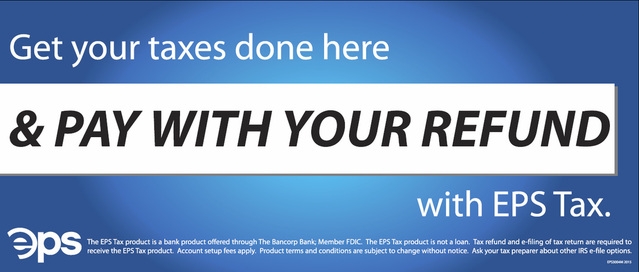
Who Should Prepare Your 2023 Tax Return?
You have several options from which to choose when looking for someone to prepare your federal and state income tax returns.
It's important that the person you choose to prepare your tax returns has a "PTIN" (Preparer Tax Identification Number). Only those individuals who have registered with the IRS and received a PTIN are authorized to prepare income tax returns for compensation. Your tax preparer must sign your finished tax return. Do not, under any circumstances, use a tax preparer, or file a tax return prepared by someone, who will not sign the finished return.
Below you will find some of the professional designations that you may want to consider:
EA (Enrolled Agent) – The Enrolled Agent is the highest credential you can receive as a tax professional, and it's the only universally accepted and government approved credential that has any meaning when it comes to competence and currency in preparing tax returns. An Enrolled Agent is a person who has earned the privilege of practicing, that is, representing taxpayers before any office of the Internal Revenue Service. An enrolled agent can negotiate with the IRS during examinations and appeals, and act in place of a taxpayer signing consents and executing agreements on their behalf.
Attorneys and certified public accountants (CPA) have state licenses, which limits their practice only to the states where they are licensed. Unlike a CPA or Attorney, an Enrolled Agent holds a federal license and has the right to represent any taxpayer in any state regarding federal tax matters.
An Enrolled Agent is considered a tax specialist, which sets them apart from attorneys or CPAs who do not always specialize in taxes. The practice of Enrolled Agents before the IRS is not limited and they may represent taxpayers before the IRS, performing the same tasks as an Attorney or CPA. The capabilities of an Enrolled Agent extend beyond just preparing returns to areas such as representing clients in cases involving audits, collections, and appeals.
CPA (Certified Public Accountant) – Contrary to popular belief, a CPA is not automatically a tax expert. A specific CPA may be knowledgeable, educated, experienced, competent, and current in tax preparation, and be the perfect choice for your tax situation, but this is only because of the knowledge, education experience and other factors that are unique to that individual preparer. Just because a person has the initials "CPA" after his or her name does not in any way, shape or form indicate the extent of that person's knowledge, education, experience, competence or currency in preparing taxes. A CPA is the most expensive of the various tax preparer options.
Annual Filing Season Program – It's a voluntary program for paid tax preparers that builds on similar concepts established under the RTRP program. These tax preparers will have limited representation rights for returns they prepare and sign, and they will be encouraged to participate in continuing education courses to remain current with changing tax laws.
Independent "un-enrolled" preparer – a tax preparer who does not possess any "initials", or professional designation, neither participates in the IRS voluntary AFSP program. Just because a tax preparer does not have initials after his or her name does not mean that he or she is not a qualified, knowledgeable , experienced, competent, and current tax professional. While there are indeed incompetent or marginally competent tax preparers out there, both with and without initials, there are many excellent independent un-enrolled preparers.
Un-enrolled return preparers can elect to voluntarily demonstrate completion of basic tax preparation and other tax law training through continuing education. Return preparers who complete the requirements for the voluntary Annual Filing Season Program will be issued a Record of Completion certificate.
The IRS is in the process of publishing a new public database that will be added to IRS.gov website by January 2015 for taxpayers to use in searching for qualified tax return preparers. The Directory of Federal Tax Return Preparers with Credentials and Select Qualifications will only include Attorneys, Certified Public Accountants (CPAs), Enrolled Agents, Enrolled Retirement Plan Agents (ERPAs), Enrolled Actuaries, and individuals who have received an Annual Filing Season Program – record of completion.
Commercial tax preparation chain – these include franchises like H&R Block, Jackson Hewitt, and Liberty Tax Service. Despite what you may think, these commercial preparers aren't cheap. When it comes to "return on investment" you will get much more value for your money in terms of current and ongoing personal and professional service by going to an independent tax preparer. In addition, you want to make sure that your tax preparer will be available long after the tax season is over.
Self-Prepared – You also have the option of preparing your own tax return. Having said that, no tax preparation software is a substitute for knowledge of the Tax Code, nor is it a substitute for the services of a competent tax professional. This option is not for everyone. The United States tax code is complex and changes regularly. It is extremely difficult for an individual to know all of the specifics of the tax code, and you could make an error, causing you to pay more in taxes. This oversight may end up costing you more than what you saved in preparation fees, particularly if you factor in penalties and interest from the IRS if you file an incorrect return. If your return is audited you cannot avoid penalties by blaming any errors on the software.
With the complexity of tax forms, and the time that it takes to organize your information, it can take a great deal of time to prepare your own taxes. You should factor in what that time is worth to you, in which case you may decide it makes sense just to pay a preparer.
Let Us Help You, Call Us Today!



